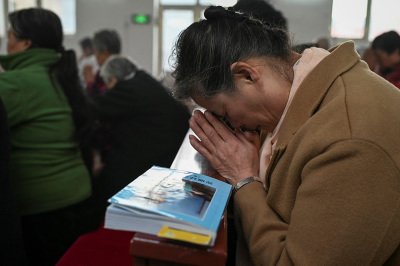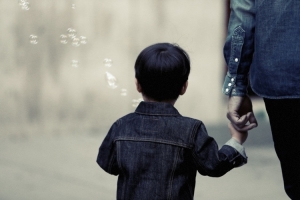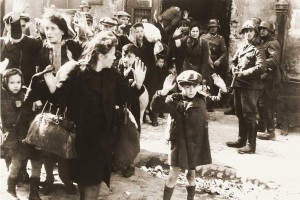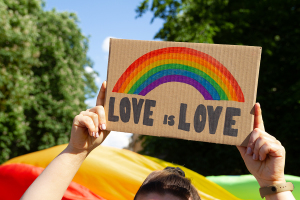Will Chinese Christians be able to celebrate Easter this year?

Celebrating Easter in China is becoming more difficult than ever. Under Chinese President Xi Jinping’s rule, holidays regarded as “Western,” such as Easter or Christmas, are being discouraged or even outright banned.
While Chinese Christians face restrictions on their religious celebrations, the Chinese government is actively promoting secular Spring Festival celebrations, requesting all state-controlled churches implement the “Sinicization of Christianity” campaign during their holiday activities.
The stark contrast in the treatment of the holiday celebrations shows how the Chinese Communist Party (CCP) employs constant control of the Chinese people in all aspects. They do this to not only assure its continued rule but also to amplify the “Chinese-ness” throughout the country to showcase its might both at home and abroad. For Christians, this means the space for them to practice their faith is rapidly shrinking. They must seek first the will of the CCP if they want to legally operate. With Easter coming soon, it is unclear how Chinese Christians will be allowed to fully celebrate.
Jinping’s Sinicization campaign, coupled with deteriorating relations between China and the West, means state-owned enterprises and schools have been instructed not to celebrate other major holidays like Christmas for the last number of years. In December 2021, the CCP’s State Administration of Religious Affairs (SARA) issued a statement of greetings to spread Christmas cheer by reminding Christians to focus on what truly matters — the success of the Chinese nation and its leader.
The sentiment of focusing inward continues to dominate the official approach to Christian celebrations. On December 16, 2023, the Public Security Bureau in Wancheng, Henan province, published an article on its Weixin platform, calling on Chinese citizens to not observe Western festivals. With an attached banner trumpeting the phrase “promote traditional culture. Reject the celebration of Western holidays,” the article argued that Easter, Christmas, Valentine’s Day, and Halloween are all cultural invasions that seek to influence the values of the younger generation.
A week after this article was published, a proposed note from the School of Materials Science and Engineering at Dalian University of Technology called for its teachers and students not to celebrate Christmas Eve or Christmas, which are regarded as foreign holidays. They were advised not to put up any Christmas decorations, send each other gifts or cards, and most importantly, not to blindly honor other countries’ holidays.
It’s an illustration of the Chinese government’s tightening ideological grip on minors, who are forbidden by the government to believe in any religion or celebrate Christian holidays. According to local Christians in the city of Wenzhou, registered churches were permitted to celebrate Christmas, but minors were banned from participating. To circumvent the rules, younger Christians celebrated Christmas in early December to avoid “violation.”
I asked a house church pastor based in southwest China whether his church has been able to celebrate the holidays. He responded, “Not anymore. The government strongly opposes the celebration of Christian holidays.” Additionally, while online celebrations were still permitted, many house churches had no choice but to halt their in-person services last Christmas. The Christian Association from the pastor’s province held a meeting in December to urge all state-vetted and CCP-approved Three-Self churches to diligently carry out the “Celebrate Chinese Holidays, Implement Sinicization” campaign.
Lunar New Year, or Spring Festival, the most celebrated holiday in China, recently concluded. Although this festival is also widely celebrated by other Asian countries, as well as diaspora communities around the world, in recent years, the Chinese government has intentionally labeled the celebration as “Chinese New Year” or “Chinese Spring Festival” for outward-facing activities and publications.
It came as no surprise then that the Three-Self churches were handed the mission of implementing the “Celebrate Chinese Holidays, Implement Sinicization” campaign ahead of this year’s New Year’s celebration. From Shanghai, Wuxi, to Gansu, numerous state-vetted churches held events to pass down the Chinese tradition of writing Chinese couplets with calligraphy. The Chinese government’s slogan “Love [Your] Country, Love [Your] Religion” became the common theme that appeared on hundreds of Chinese couplets freely gifted to event participants. At a Spring Festival celebration held at Liaozhong District Church in the city of Shenyang, visitors received a handheld Chinese flag, a red scarf, and a Chinese couplet. Several renowned cultural groups and singers performed patriotic tunes and dances, before they joined the audience and CCP leaders in unison, singing “My People, My Country” as the grand finale. No religious talk was permitted.
As Good Friday and Easter approach, let’s pray for creativity and flexibility for Chinese churches, so they can find ways to worship and celebrate. Let’s pray that Three-Self churches bravely put Truth first and that the message of Jesus’ death and resurrection will not be silenced despite the best efforts of the CCP.
CJ Wu is a writer for Global Christian Relief (GCR), America’s leading watchdog organization focused on the plight of persecuted Christians worldwide. In addition to equipping the Western church to advocate and pray for the persecuted, GCR works in the most restrictive countries to protect and encourage Christians threatened by faith-based discrimination and violence.




























